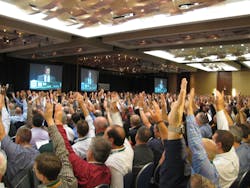View the Firefighters & Fire Sprinklers—Partners in Progress supplement in its entirety via Firehouse’s proprietary digital platform Clarity, which includes additional content and videos, here.
Download the full PDF of the PPE supplement here.
View Firehouse’s collection of supplements and special content at firehouse.com/special-content.
What do you know about the codes and standards that you enforce? These codes and standards are developed by code officials, members of the fire service and industry stakeholders who want to make our communities safer and adapt to a changing world. The men and women who develop codes and standards are not a niche of the fire or building industry; they are like you—committed to life safety.
In-person to online
Code development is not what it used to be. There are still long hours and long discussions, but today’s code hearings do not force on you a book that requires out-of-state travel and a backlog of inspections and plan reviews when you return. No, today’s codes—such as the International Fire Code (IFC), International Building Code (IBC) and International Residential Code (IRC)—are determined by you, and what’s better is that it’s all through a simple online vote. Is your vote being counted? If not, you’re missing out on the opportunity to have your voice heard.
The code development process in this country started more than 120 years ago by forming industries into associations to create health, safety and life safety codes. That process made a model that lasted until today’s digital age. Now, the International Code Council (ICC) and the National Fire Protection Association (NFPA) are moving much of the code development process online.
In years past, for someone to have a say on what goes into building and fire codes, a physical presence was required at a hearing. If you mailed or faxed a proposal to change the code and you could not get the chief or department head to sign off on your $2,000-plus out-of-state travel request, then your proposal was without a voice. Several months later, you would have to search through pages and pages of hearing results to find the result of your idea.
Today, the same proposal can be collaborated beforehand through interested parties, such as ICC’s Fire Code Action Committee (FCAC), the Building Code Action Committee (BCAC) or the local Regional Work Groups, which are arranged in four geographical regions in the United States, or through a public participation forum available through ICC’s cdpACCESS website (https://cdpaccess.com).
Code hearings are broadcast online live and results are heard immediately. Never before has code collaboration and participation been at this level.
It matters!
Code development today depends on you, no matter what rank you are or what part of the country you work and live in. The future of the codes you enforce are voted on by you, online. There are parts of the code development process that are still done in person, and code officials attending these code hearings is crucial. It is important for international codes to get as much geographical and diverse input from all aspects of construction, enforcement and industry. Your involvement makes a big difference on how codes and standards will be written, and it will ultimately have a significant impact on your community.
You may still be thinking, what does it matter? How could my support for residential sprinklers, fire department access, radio coverage or other issues matter? It matters because your vote unites with thousands of other fire marshals, inspectors, chiefs and code officials from across the country and world who have the same passion and dedication.
Remember the oath you took to serve your communities or that commitment you have to life safety? It extends to writing good codes, too. Get involved in the codes and standards development process today!
About the Author
Jeffrey M. Hugo
Jeffrey M. Hugo, CBO, is the manager of codes for the NFSA.
